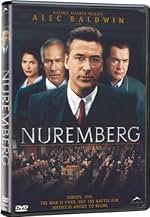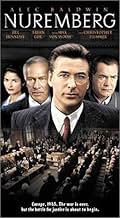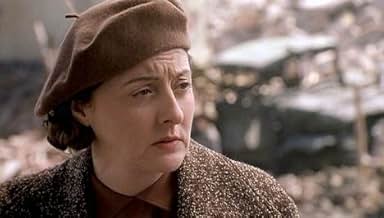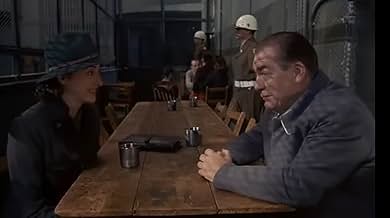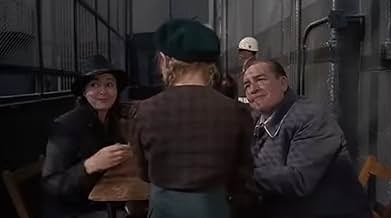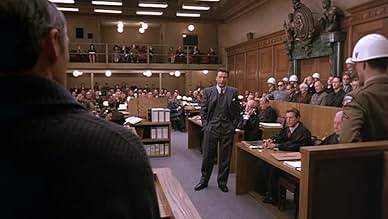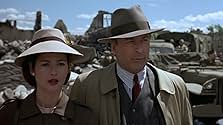Der dramatisierte Bericht über die Kriegsverbrecherprozesse nach der Niederlage Nazideutschlands im Zweiten Weltkrieg.Der dramatisierte Bericht über die Kriegsverbrecherprozesse nach der Niederlage Nazideutschlands im Zweiten Weltkrieg.Der dramatisierte Bericht über die Kriegsverbrecherprozesse nach der Niederlage Nazideutschlands im Zweiten Weltkrieg.
- 2 Primetime Emmys gewonnen
- 10 Gewinne & 33 Nominierungen insgesamt
Folgen durchsuchen
Empfohlene Bewertungen
Hidden inside this purported battle between surviving top Nazi Hermann Goering and American prosecutor Judge Robert Jackson is, I think, the adaptation the writer probably wanted to do - the story of psychologist G. M. Gilbert and his backstage verbal tusslings with men who either refused to acknowledge any guilt (Goering, Streicher) or conversely were overflowing with it (Frank, Speer).
When you see Alec Baldwin appear a second time in the credits, as Executive Producer, you feel that Nuremberg was probably conceived as a vanity project for him. Fortunately it is quite easy to let the early scenes of the Court's setup just wash over you, and of course Jill Hennessey is always easy on the eyes. Much of the first half of the first episode is more or less soap opera. Jackson has to persuade Judge Biddle to go to Nuremberg, then to relinquish the Presidency of the court to the British. The bantering relationship with his secretary (Hennessey) serves as a prelude to their becoming lovers during their time in Germany.
At this point Hermann Goering appears (the great Brian Cox on top form), totally dominating the trial, totally dominating this mini-series, and your attention is grasped and held. Cox almost wipes Baldwin off the screen. Unfortunately it's very hard not to gain a great deal of sympathy for Goering, particularly when he is with his family, or in the heart-to-heart chats with his G. I. prison guard, Tex. We see Goering as he undoubtedly saw himself, but in reality he wasn't like that at all. The Nuremberg trial and the general travails of imprisonment were an excellent opportunity for him to smarten himself up: prior to his arrest he had become a dissolute and overweight drug addict. Unfortunately no sign of this weakness of character was carried over into the script, leaving an impression of Goering as a noble, principled man - irrespective of whether you agreed with his principles.
Also very watchable was Matt Craven in the role of Gilbert the aforementioned psychologist, and Christopher Plummer as British prosecutor David Maxwell-Fyfe (although the real Maxwell-Fyfe was the younger prosecutor, not an elder mentor as depicted here). Particularly gratifying is the scene in which Maxwell-Fyfe tells Jackson that "your documentary approach is legally impeccable - but as drama it's absolutely stultifying" - which might stand as an apt description of Baldwin's part in this series.
A last little curiosity, and not to make any personal remarks about Herbert Knaup, but I did find it strange that they cast Knaup, a slightly odd-looking actor, to play Albert Speer, by fairly common consent the handsomest and most photogenic of all the Nazi leaders, particularly as Speer was portrayed here in a sympathetic light. Other than Knaup, many of the actors were very close in looks to their real-life counterparts, most notably Roc LaFortune as Rudolf Hess, almost a living double.
When you see Alec Baldwin appear a second time in the credits, as Executive Producer, you feel that Nuremberg was probably conceived as a vanity project for him. Fortunately it is quite easy to let the early scenes of the Court's setup just wash over you, and of course Jill Hennessey is always easy on the eyes. Much of the first half of the first episode is more or less soap opera. Jackson has to persuade Judge Biddle to go to Nuremberg, then to relinquish the Presidency of the court to the British. The bantering relationship with his secretary (Hennessey) serves as a prelude to their becoming lovers during their time in Germany.
At this point Hermann Goering appears (the great Brian Cox on top form), totally dominating the trial, totally dominating this mini-series, and your attention is grasped and held. Cox almost wipes Baldwin off the screen. Unfortunately it's very hard not to gain a great deal of sympathy for Goering, particularly when he is with his family, or in the heart-to-heart chats with his G. I. prison guard, Tex. We see Goering as he undoubtedly saw himself, but in reality he wasn't like that at all. The Nuremberg trial and the general travails of imprisonment were an excellent opportunity for him to smarten himself up: prior to his arrest he had become a dissolute and overweight drug addict. Unfortunately no sign of this weakness of character was carried over into the script, leaving an impression of Goering as a noble, principled man - irrespective of whether you agreed with his principles.
Also very watchable was Matt Craven in the role of Gilbert the aforementioned psychologist, and Christopher Plummer as British prosecutor David Maxwell-Fyfe (although the real Maxwell-Fyfe was the younger prosecutor, not an elder mentor as depicted here). Particularly gratifying is the scene in which Maxwell-Fyfe tells Jackson that "your documentary approach is legally impeccable - but as drama it's absolutely stultifying" - which might stand as an apt description of Baldwin's part in this series.
A last little curiosity, and not to make any personal remarks about Herbert Knaup, but I did find it strange that they cast Knaup, a slightly odd-looking actor, to play Albert Speer, by fairly common consent the handsomest and most photogenic of all the Nazi leaders, particularly as Speer was portrayed here in a sympathetic light. Other than Knaup, many of the actors were very close in looks to their real-life counterparts, most notably Roc LaFortune as Rudolf Hess, almost a living double.
Well done, as television movies go. There seems to have been a substantial budget and an awful lot of research behind it. There are times when points and characters are overstated, but it's an improvement over "Judgment at Nuremberg." This film puts the Nazi leaders on trial and finds most of them guilty of crimes against humanity, while others are sentenced to prison. "Judgment at Nuremberg" put the entire nation of Germany on trial, handed the thankless task of defending Germany's role in World War II to Maximilion Schell, and found every German who ever breathed to be guilty of every sin that's ever been committed in the history of humankind. The scriptwriter, Abby Mann, accepted his Academy Award "in the name of all intellectuals everywhere." This modest production fills in many of the blanks that are missing from the public's understanding of the Nuremberg trials. Where, for instance, did the prisoners and staff of the trials find housing in Nuremberg, an ancient city that had been flattened by Allied bombing and in which there were still hundreds of decomposing bodies beneath the rubble? And did all the four major powers -- the US, Britain, France and Russia agree on the format and the procedures? Answer: No, the Russians and the French, who had suffered most under Nazissm, wanted summary executions of all the bigwigs. The subject is dead serious but the program has its quietly amusing moments -- the brash, ugly Russian representative trying to persuade the horrified French representative that he should lace his fine wine with a good belt of vodka. It has the limitations of most commercial productions. The Russian guy really IS ugly, and almost all the Germans are played by men with names like O'Keefe. There are many choker closeups, a technique that befits the small screen.
The Nazi leaders of course are villains of the worst sort but they're shown as humans too. After the surrender, an ebullient Goering, Brian Cox, unexpectedly drives up to an American Air Force base with his wife and child, dismounts from his chauffeur-driven car, and formally hands over his sword to an astounded General Spaatz -- "one airman to another." After being feted publicly, the victors soon round him up and place him in a cell, as had been done with the other prisoners. An American lieutenant, Tex Wheeler, is posted as Goering's personal guard. Scott Gibson gives a convincing performance. Wheelis will play a larger role in Goering's fate later.
Alex Baldwin is Robert H. Jackson, who more or less runs the show. His assistant Jill Hennessy is a fox and the rest of the cast is quite good. There are too many airy conversations about moral superiority and the viewer is urged to want Baldwin to treat Georing on the stand as the despicable, conniving swine he is. Should he? How does the word "disinterested" differ from "uninterested"? The most chilling testimony comes from the Commandant of Auschwitz, who describes the camp's activities precisely and dispassionately -- showing neither indignation or remorse.
Unfortunately, the prosecution insists on presenting not just documentary evidence but witnesses too, in order to deliberately heighten the drama behind the trial. It's pretty sickening, naturally, and to many adults it's repetitive. We know about the medical experiments in which Jews were kept in freezing water until they died. And so we sit through the familiar revolting images of the charred skeleton in the oven, the walking cadavers, the old man praying as he lies on a stretcher, the waxlike naked bodies piled on one another in mounds, the bulldozer shoveling them into the empty pit. I doubt that anyone needs to be REMINDED of what happened. But maybe it's just as well that we go through it all again because I'm not sure how much of this material has faded from our collective memory. One in six English youngsters thought Auschwitz was a World War II theme park, and one in six thought Hitler was a football coach.
And, at that, there are some insights into what has always been a blank at least in my mind. Goering was head of the Luftwaffe. So? What did he have to do with the treatment of the Jews and other devalued minorities? Simple. The experiments that froze subjects to death in ice water were undertaken at his request in order to discover how Luftwaffe crew might best survive if shot down in northern waters. Except for a few, the defendants all seem like unregenerate Nazis. Well, except for Rudolf Hess too, because he was nuts. It may seem like a mistake to have Julius Streicher portrayed as a rabid anti-Semite, pounding the table, ranting against Jews, his features in a cataleptic sneer. But that was the kind of guy he really was. He wasn't a military man but his railing against the Jews amounted to paranoia. He combed the pages of the Talmud and the Old Testament in search of passages that painted Judaism as harsh or cruel, rather like some of us are now doing with the Koran. It's easy.
Some of the prisoners, like Albert Speer, the architect who became Hitler's Armaments Minister, admit their guilt. Others rely on the rationale that they were only following orders. This excuse is always dismissed by civilized people but mistakenly in my opinion.
Not in this case, perhaps, but for "only following orders" substitute "doing what I was expected to do," and we're all guilty, even if the "orders" are sometimes unspoken, in which case they're known as "command pressure" or "peer pressure" or "keeping up with the Joneses." One doubtful ex-Nazi, Hans Frank, puts it this way: "I wanted to keep my job." Suppose, instead of "job", we substitute "public opinion" or "the respect of my community"? From a sociological point of view, the intricacies are myriad.
The Nazi leaders of course are villains of the worst sort but they're shown as humans too. After the surrender, an ebullient Goering, Brian Cox, unexpectedly drives up to an American Air Force base with his wife and child, dismounts from his chauffeur-driven car, and formally hands over his sword to an astounded General Spaatz -- "one airman to another." After being feted publicly, the victors soon round him up and place him in a cell, as had been done with the other prisoners. An American lieutenant, Tex Wheeler, is posted as Goering's personal guard. Scott Gibson gives a convincing performance. Wheelis will play a larger role in Goering's fate later.
Alex Baldwin is Robert H. Jackson, who more or less runs the show. His assistant Jill Hennessy is a fox and the rest of the cast is quite good. There are too many airy conversations about moral superiority and the viewer is urged to want Baldwin to treat Georing on the stand as the despicable, conniving swine he is. Should he? How does the word "disinterested" differ from "uninterested"? The most chilling testimony comes from the Commandant of Auschwitz, who describes the camp's activities precisely and dispassionately -- showing neither indignation or remorse.
Unfortunately, the prosecution insists on presenting not just documentary evidence but witnesses too, in order to deliberately heighten the drama behind the trial. It's pretty sickening, naturally, and to many adults it's repetitive. We know about the medical experiments in which Jews were kept in freezing water until they died. And so we sit through the familiar revolting images of the charred skeleton in the oven, the walking cadavers, the old man praying as he lies on a stretcher, the waxlike naked bodies piled on one another in mounds, the bulldozer shoveling them into the empty pit. I doubt that anyone needs to be REMINDED of what happened. But maybe it's just as well that we go through it all again because I'm not sure how much of this material has faded from our collective memory. One in six English youngsters thought Auschwitz was a World War II theme park, and one in six thought Hitler was a football coach.
And, at that, there are some insights into what has always been a blank at least in my mind. Goering was head of the Luftwaffe. So? What did he have to do with the treatment of the Jews and other devalued minorities? Simple. The experiments that froze subjects to death in ice water were undertaken at his request in order to discover how Luftwaffe crew might best survive if shot down in northern waters. Except for a few, the defendants all seem like unregenerate Nazis. Well, except for Rudolf Hess too, because he was nuts. It may seem like a mistake to have Julius Streicher portrayed as a rabid anti-Semite, pounding the table, ranting against Jews, his features in a cataleptic sneer. But that was the kind of guy he really was. He wasn't a military man but his railing against the Jews amounted to paranoia. He combed the pages of the Talmud and the Old Testament in search of passages that painted Judaism as harsh or cruel, rather like some of us are now doing with the Koran. It's easy.
Some of the prisoners, like Albert Speer, the architect who became Hitler's Armaments Minister, admit their guilt. Others rely on the rationale that they were only following orders. This excuse is always dismissed by civilized people but mistakenly in my opinion.
Not in this case, perhaps, but for "only following orders" substitute "doing what I was expected to do," and we're all guilty, even if the "orders" are sometimes unspoken, in which case they're known as "command pressure" or "peer pressure" or "keeping up with the Joneses." One doubtful ex-Nazi, Hans Frank, puts it this way: "I wanted to keep my job." Suppose, instead of "job", we substitute "public opinion" or "the respect of my community"? From a sociological point of view, the intricacies are myriad.
This is a strange subject for a modern TV series designed to entice an audience to whom World War II is as distant as the Pelopenesian Wars. Yet this is a tough, well produced, historically accurate and thoroughly compelling film. Brian Cox steals the show with a masterful recreation of Hermann Goering as a beguiling rogue. And the production techniques excel, for example the sound track as silent film of the concentration camps is shown to the trial. It puts the horror in context without exploiting it or sensationalizing it. A brilliant piece of historical film making.
I was only a teenager when the Nuremberg trials began, and I (as most other people throughout the world) had very little true knowledge of the horror stories of the victims of Nazi atrocities. When the truth burst upon the world, many people could not believe what they saw. (Some neo-nazi fools still deny everything.)
This is not an easy film to watch, especially with actual films of the frightful deathcamps, but one is drawn into the story because it was such a momentous event - that the major Allies of WWII united to have fair and open trials not just of single criminals, but of an evil governmental system.
Alec Baldwin has done a magnificent job in his role as Robert Jackson, who was the Chief Prosecutor. I wish I could thank him, as co-producer of this fine mini-series, for such a vivid rendering of those years.
Yes, there are still horrors being perpetrated on innocent victims in many parts of the world today, but the world IS watching, and in many cases, is resisting these evil governments.
I suggest that it is of UTMOST IMPORTANCE that young people today watch this film. Too many young (and many older) people think of WWII as only a rather heroic glorious time; I want them to know what some human beings were doing to other innocent victims. Believe me it is NOT boring. Yes, there were many, many heroes. I know. I married a young man who had fought with the Greek resistance movement and suffered greatly, but his spirit, as that of many others, could not be conquered. We must not forget!
This is not an easy film to watch, especially with actual films of the frightful deathcamps, but one is drawn into the story because it was such a momentous event - that the major Allies of WWII united to have fair and open trials not just of single criminals, but of an evil governmental system.
Alec Baldwin has done a magnificent job in his role as Robert Jackson, who was the Chief Prosecutor. I wish I could thank him, as co-producer of this fine mini-series, for such a vivid rendering of those years.
Yes, there are still horrors being perpetrated on innocent victims in many parts of the world today, but the world IS watching, and in many cases, is resisting these evil governments.
I suggest that it is of UTMOST IMPORTANCE that young people today watch this film. Too many young (and many older) people think of WWII as only a rather heroic glorious time; I want them to know what some human beings were doing to other innocent victims. Believe me it is NOT boring. Yes, there were many, many heroes. I know. I married a young man who had fought with the Greek resistance movement and suffered greatly, but his spirit, as that of many others, could not be conquered. We must not forget!
My first impression of this film was that it was excellently done. It provoked my curiosity and I am glad to say the film held up under my further investigation of the trials.
The accurate representation of the grayness of a subject most would consider black and white was particularly courageous. It would be easy to paint the Nazis as monsters without souls, but so often terrible things are done by perfectly ordinary people. In fact that is what is so terrible about people's actions in WWII. Malevolence would certainly be easier to accept than what this film shows was at the source of the Nazi behavior -- indifference and lack of empathy. Who hasn't felt indifference toward someone they met in everyday life, the cashier who was too slow, the person in the car ahead, the telemarketer?
The acting was excellent, particularly Brian Cox, who showed us how well charm can mask evil. I did not think Goering was white-washed. This was shown most clearly in his pathetic attempt to shrug off the concentration camp film. Even his manipulative skill couldn't ease that shock, and his American friend was silent. If Alex Baldwin pumped up his drama a little, well, take a look at transcripts of the trial, which are drier than the Sahara. The use of documents was extensive during the trial and how often does the layperson want to hear that? The use of the concentration camp film was a cold dash of water in the face of such dryness. Some other comments question the inclusion of the relationship between Jackson and his secretary. I didn't see it as a "love story", but more as an "adultery story" used to show on a more personal level that despite his side's claim to superior "morals" Jackson was also weak. I think the Soviet involvement and the Polish massacre was left out because it would have been too long to include in all its convolutions. It is an interesting part of the story, however, so I recommend researching it.
I was glad to see on the comments that those who know more than I pointed out its accuracy. Too rarely does Hollywood actually attempt that.
The accurate representation of the grayness of a subject most would consider black and white was particularly courageous. It would be easy to paint the Nazis as monsters without souls, but so often terrible things are done by perfectly ordinary people. In fact that is what is so terrible about people's actions in WWII. Malevolence would certainly be easier to accept than what this film shows was at the source of the Nazi behavior -- indifference and lack of empathy. Who hasn't felt indifference toward someone they met in everyday life, the cashier who was too slow, the person in the car ahead, the telemarketer?
The acting was excellent, particularly Brian Cox, who showed us how well charm can mask evil. I did not think Goering was white-washed. This was shown most clearly in his pathetic attempt to shrug off the concentration camp film. Even his manipulative skill couldn't ease that shock, and his American friend was silent. If Alex Baldwin pumped up his drama a little, well, take a look at transcripts of the trial, which are drier than the Sahara. The use of documents was extensive during the trial and how often does the layperson want to hear that? The use of the concentration camp film was a cold dash of water in the face of such dryness. Some other comments question the inclusion of the relationship between Jackson and his secretary. I didn't see it as a "love story", but more as an "adultery story" used to show on a more personal level that despite his side's claim to superior "morals" Jackson was also weak. I think the Soviet involvement and the Polish massacre was left out because it would have been too long to include in all its convolutions. It is an interesting part of the story, however, so I recommend researching it.
I was glad to see on the comments that those who know more than I pointed out its accuracy. Too rarely does Hollywood actually attempt that.
Wusstest du schon
- WissenswertesBrian Cox claimed that the sequence in which the courtroom is shown a film of Nazi concentration camps required numerous takes. With the actual film being projected, genuine walkouts occurred on-set from crew members who couldn't take watching it anymore.
- PatzerAt the end of the trial, Field Marshall Wilhelm Keitel is referred to as "Admiral Keitel."
- Zitate
Reichsmarschall Hermann Wilhelm Göring: One German, a fine man. Two Germans, a bund. Three Germans, a war. One Englishman, an idiot. Two Englishmen, a club. Three Englishmen, an Empire.
- VerbindungenFeatured in The 58th Annual Golden Globe Awards 2001 (2001)
- SoundtracksDeep in the Heart of Texas
Written by June Hershey and Don Swander
Performed by cast
Melody Lane Music c/o Peermusic International
Top-Auswahl
Melde dich zum Bewerten an und greife auf die Watchlist für personalisierte Empfehlungen zu.
- How many seasons does Nuremberg have?Powered by Alexa
Details
- Erscheinungsdatum
- Herkunftsländer
- Offizieller Standort
- Sprachen
- Auch bekannt als
- Nuremberg
- Drehorte
- Produktionsfirmen
- Weitere beteiligte Unternehmen bei IMDbPro anzeigen
- Laufzeit
- 1 Std. 30 Min.(90 min)
- Farbe
- Sound-Mix
- Seitenverhältnis
- 1.85 : 1
Zu dieser Seite beitragen
Bearbeitung vorschlagen oder fehlenden Inhalt hinzufügen



